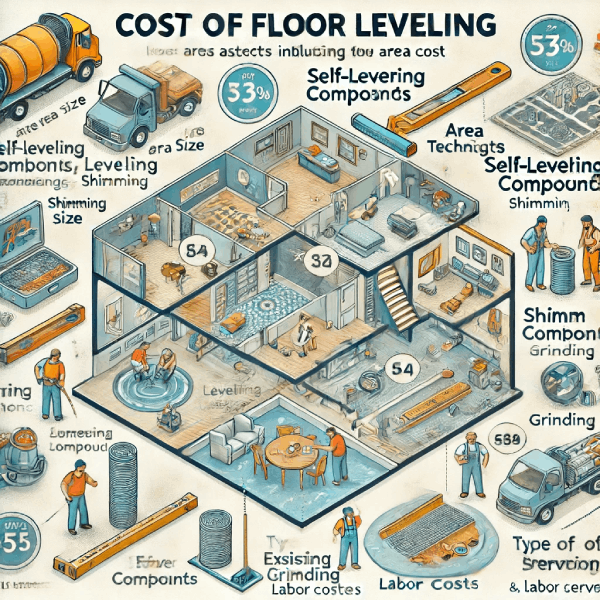Key Takeaways
| Aspect | Details |
|---|---|
| Importance of Floor Leveling | Essential for safety, aesthetics, and structural integrity. |
| Common Techniques | Self-leveling compounds, shimming, grinding. |
| Cost Factors | Area size, technique used, type of existing floor, and labor costs. |
| Typical Price Range | Residential: $2-$5 per square foot; Commercial: $3-$6 per square foot. |
| Benefits of Professional Service | Precision, expertise, durability, and long-term savings. |
| DIY vs. Professional | Professional services recommended for precise and lasting results. |
Floor leveling is a critical process in both residential and commercial settings, ensuring that your flooring is not only aesthetically pleasing but also safe and structurally sound. The cost of floor leveling varies based on several factors, including the size of the area, the specific leveling technique employed, and labor costs. Here's a comprehensive look at what you can expect in terms of pricing and the factors that influence these costs.

Factors Influencing Floor Leveling Costs
Area Size
The size of the area to be leveled is one of the primary determinants of cost. Larger areas naturally require more materials and labor, leading to higher overall expenses.
Leveling Techniques
Various techniques are employed in floor leveling, each with its cost implications:
- Self-Leveling Compounds: These are ideal for minor adjustments and involve pouring a compound over the existing floor to create a smooth, level surface. This method is relatively cost-effective and quick.
- Shimming: This involves inserting shims under joists or beams to correct sagging areas. It is a common technique for wooden subfloors.
- Grinding: Used primarily for concrete floors, grinding involves removing high spots to achieve a level surface. This method is labor-intensive and may cost more due to the equipment and expertise required.
Existing Floor Type
The type of floor currently in place also affects the cost. For instance, leveling a concrete floor may involve different techniques and materials compared to a wooden subfloor, impacting the overall price.
Labor Costs
Labor costs can vary significantly depending on the region and the complexity of the job. Professional floor leveling services, while more expensive upfront, ensure precision and durability, potentially saving money in the long run by avoiding future repairs.
Typical Costs
Residential Floor Leveling
For residential projects, the cost typically ranges from $2 to $5 per square foot. This includes materials and labor but can vary based on the factors mentioned above.
Commercial Floor Leveling
Commercial floor leveling tends to be more expensive, with costs ranging from $3 to $6 per square foot. This is due to the larger areas involved and the higher standards required for commercial spaces, which often demand more durable solutions and compliance with safety regulations (Amazon S3) (Amazon S3).
DIY vs. Professional Services
While DIY floor leveling is an option, it often lacks the precision and durability of professional services. Professionals bring expertise and the right tools to the job, ensuring that the floor is perfectly level and durable. This is particularly important for commercial spaces where safety and compliance are critical (Amazon S3) (Amazon S3).
Conclusion
Floor leveling is an essential investment for both residential and commercial properties, ensuring safety, aesthetics, and longevity. By understanding the factors that influence cost and the benefits of professional services, property owners can make informed decisions that enhance the value and functionality of their spaces.
For more detailed information and to schedule a professional consultation, visit our Commercial Floor Leveling page.
from
https://frank-thompson.s3.amazonaws.com/index.html
Comments
Post a Comment